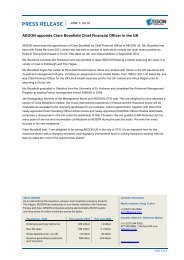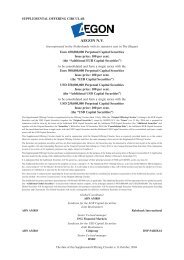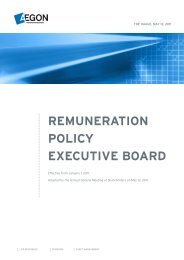Download - Aegon
Download - Aegon
Download - Aegon
- No tags were found...
Create successful ePaper yourself
Turn your PDF publications into a flip-book with our unique Google optimized e-Paper software.
40 Business overview Overview Americasin 2013. The impact of regulations resulting from these studies cannot be predictedat this time.The financial services industry, which includes businesses engaged in issuing,administering, and selling variable insurance products, mutual funds, and othersecurities, as well as broker-dealers, continues to be under heightened scrutiny andincreased regulation in various jurisdictions. Such scrutiny and regulations haveincluded matters relating to so-called producer compensation arrangements,suitability of sales, selling pra ctices, unclaimed property reporting, revenue sharing,and valuation issues involving mutual funds and life insurance separate accountsand their underlying funds. <strong>Aegon</strong> USA companies, like other businesses in thefinancial services industry, have received inquiries, examinations, and requests forinformation from regulators and others relating to certain <strong>Aegon</strong> USA companies’historical and current practices with respect to these and other matters. Some ofthose inquiries have led to investigations, which remain open or have resulted infines, corrective actions or restitution. <strong>Aegon</strong> USA companies continue to cooperatewith these regulatory agencies. In certain instances, <strong>Aegon</strong> USA companiesmodified business practices in response to those inquiries or findings. Certain<strong>Aegon</strong> USA companies have paid or been informed that the regulators may seekrestitution, fines or other monetary penalties or changes in the way that business isconducted. The impact of any such fines or other monetary penalties is notexpected to have a material impact on <strong>Aegon</strong> USA’s financial position, net incomeor cash flow. Over the years, there has been an increase in litigation across theindustry, new legislation, regulations, and regulatory initiatives aimed at curbingalleged improper annuity sales to seniors. As many of the estimated 77 million babyboomers are reaching the age of 60, the industry will likely see an increase in seniorissues presented in various legal arenas. In addition, certain industry practices inrespect of market conduct have been the subject of investigations by various stateregulators. With the significant decline in financial markets in late 2008 and early2009, management expects there will be further regulation and litigation which couldincrease costs and limit <strong>Aegon</strong> USA’s ability to operate.Some <strong>Aegon</strong> USA companies offer products and services to individual retirementaccounts (IRAs), pension and welfare benefit plans that are subject to the federalEmployment Retirement Income S ecurity Act (ERISA). ERISA is administered bythe US Department of Labor (DOL) and Internal Revenue Service (IRS).Accordingly, the DOL and IRS have jurisdiction to regulate the products andservices sold by these <strong>Aegon</strong> USA businesses. DOL has issued regulationsdefining the nature of fees to be paid for investment advice in these plans, as wellas requiring increased fee disclosure from defined contribution plan serviceproviders and to plan participants. The DOL has indicated that it will re-proposeregulations regarding the scope of an “investment advice fiduciary” in IRAs anddefined contribution plans, as well as further define the nature of aplan sponsor’s obligations regarding certain plan participants’ investment optionsselected through a plan’s brokerage window. Implementation of these and otherregulations in the manner proposed could increase the cost and administrativeburdens of the <strong>Aegon</strong> USA companies.Finally, both the US Treasury Department has published, and the DOL have or areexpected to offer, guidance addressing some of the administrative burdens ofoffering annuities both as an investment option in a retirement savings plan or as adistribution from that plan. This guidance, the legislative proposals, and additional,anticipated regulatory guidance, are expected to significantly reduce theadministrative burden of offering annuities within a retirement savings plan or as adistribution option from the plan.In an attempt to increase the number of workers covered by a retirement savingsplan, California has enacted legislation that would permit non-governmental workersto join the state government workers retirement plan or a similar governmental plan.Certain steps must be taken, however, before the legislation can be implemented.Several other states are considering similar legislation. The opening of Stateretirement plans to non-governmental workers could impact the products andsevices sold by some <strong>Aegon</strong> USA companies to private employers in those states.Although the insurance business is regulated at state level, the US federal taxtreatment of life insurance, pension and annuity products are governed by the USfederal tax code. Proposals to remove or decrease the value of these tax incentivesfor these products - both in and of themselves and relative to other investmentvehicles - are debated periodically in the US Congress and are also proposed in theExecutive Administration’s annual budget for the US federal government. ExecutiveAdministration budget proposals, to be effective, must be enacted by Congressbefore they become law. This risk of tax changes is heightened when additionalrevenue is sought to reduce the federal deficit. In addition, current discussions onmajor tax reform initiatives further increase the risk of changes to the tax incentivesfor short- and long-term savings products, as well as t o the taxation of life insurers.These changes, if enacted, would directly impact the cost and competitiveness oflife insurance, annuity and pension products sold to ensure Americans’ financialretirement security.Moreover, legislative proposals which impose restrictions on executivecompensation or restrict employment-based savings plans, adversely impact thesale of life insurance products used in funding those plans and their attractivenessrelative to other non-insurance products. Finally, regulations announced under theDodd-Frank Act that limit investment by banks in certain financial services productsor increase the cost of issuing certain life insurance products would adverselyimpact the sale of life insurance products. In particular, the market for stable value













